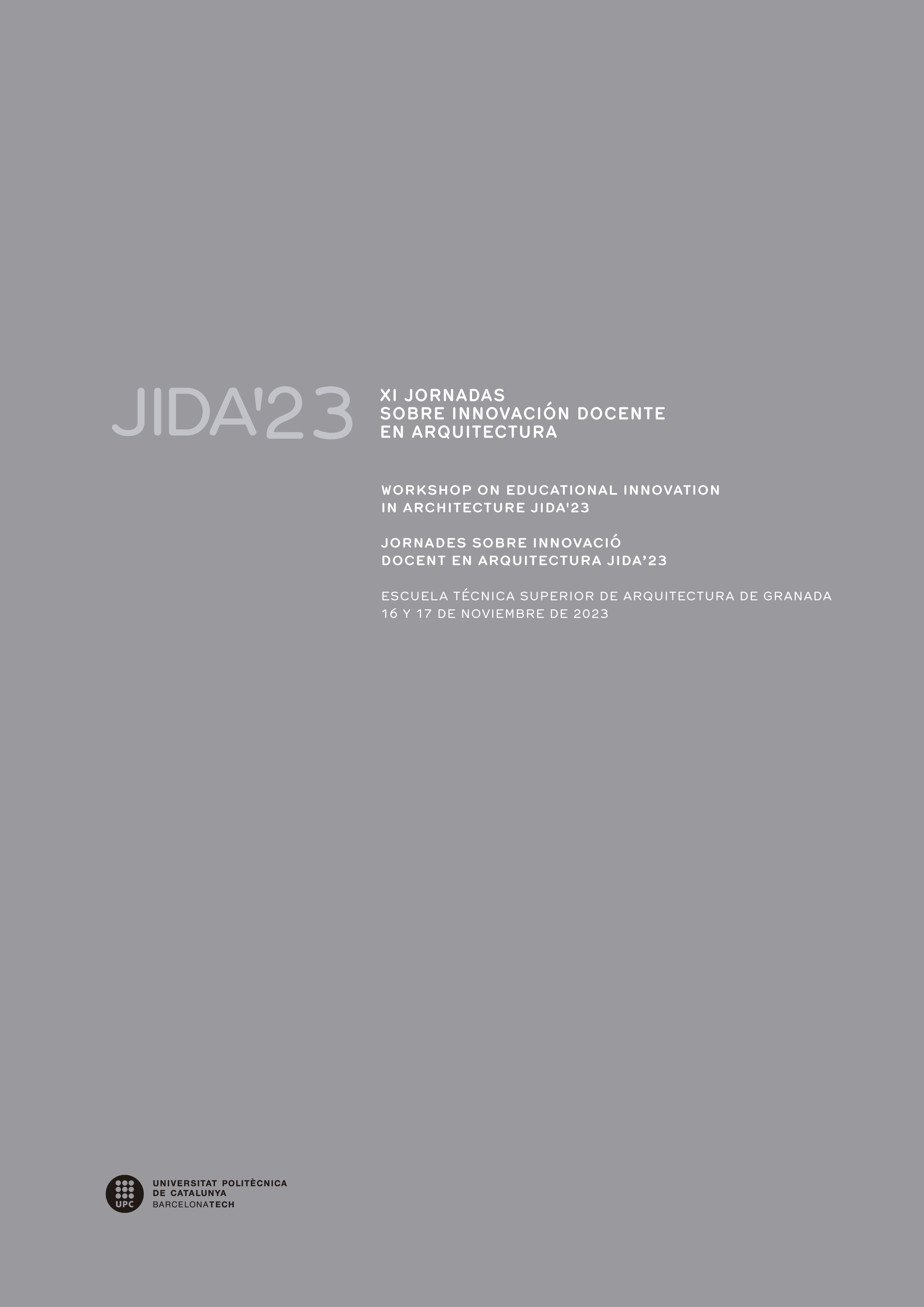Flipped classroom, gamification and multimedia in Construction by using social networks
DOI:
https://doi.org/10.5821/jida.2023.12131Keywords:
active learning, constructive systems, flipped classroom, audiovisual material, TikTokAbstract
The complexity of technical subjects related to the construction field, in Architecture Studies, is elevated in the first years of study due to the lack of fundamental knowledge of terms and properties in construction systems. Students enter their first year without previous fundamental training, in most cases, without having visited a construction site, generating pedagogical challenges. Given the complexity of the subject, traditional teaching causes mechanisation and memorisation, erroneous on many occasions, replacing reasoning and understanding of the usefulness of each system and constructive solution. Taking advantage of the entertaining and dynamic potential of Social Networks in students, this work analyses the design, development, and experimentation of a flipped classroom teaching model that combines explanations of main concepts and construction systems through recorded and explained videos by the students themselves, in search of an active, playful and motivating learning methodology.
References
Barbero-Barrera, María del Mar; Sánchez-Aparicio, Luis Javier; Gayoso Heredia, Marta. 2022 «Pedagogía de la construcción: combinación de técnicas de aprendizaje». En X Jornadas sobre Innovación Docente en Arquitectura (JIDA'22), Escuela Técnica Superior de Arquitectura de Reus, 17 y 18 de Noviembre de 2022: libro de actas, editado por Daniel García Escudero y Berta Bardí Milà, 163-171. Barcelona: UPC IDP GILDA. ISBN: 978-84-9880-551-2
Del Río-Gamero, B.; Santiago, D.E.; Schallenberg-Rodríguez, J.; Melián-Martel, N. 2022. «Does the use of videos in flipped classrooms in engineering labs improve student performance?» Education Sciences, 12, 735. DOI:10.3390/educsci12110735
Gilboy M, Heinerichs S, Pazzaglia G. 2015. «Enhancing student engagement using the flipped classroom». Journal of Nutrition Education and Behavior 47: 109-14.
Kerr, B.2015. «The flipped classroom in engineering education: A survey of the research» en 2015 International Conference on Interactive Collaborative Learning (ICL), 815-818, Firenze, Italy. DOI: 10.1109/ICL.2015.7318133.
Lasry N, Dugdale M, Charles E. 2014. «Just in time to flip your classroom». The Physics Teacher 52: 34-37.
Maciá Torregrosa, María Eugenia. «Técnicas de animación para la comprensión y narración de procesos de montaje constructivos». En IX Jornadas sobre Innovación Docente en Arquitectura (JIDA'21), Escuela Técnica Superior de Arquitectura de Valladolid, 11 y 12 de Noviembre de 2021: libro de actas, editado por Daniel García Escudero y Berta Bardí Milà, 49-60. Barcelona: UPC IDP GILDA. ISBN: 978-84-9880-969-5
Martínez-Jiménez R, Ruiz-Jiménez M C. 2020. «Improving students’ satisfaction and learning performance using flipped classroom». The International Journal of Management Education, 18, 3, 100422 https://doi.org/10.1016/j.ijme.2020.100422
McLaughlin J, Roth M, Glatt D, Gharkholonarehe N, Davidson C, Grin L, Esserman D, Mumper R. 2014. «The flipped classroom: A course redesign to foster learning and engagement in a health professions school». Academic Medicine 89: 236-43
McLean S, Attardi S. 2018. «Sage or guide? Student perceptions of the role of the instructor in a flipped classroom». Active Learning in Higher Education, 1-13.
Mingorance, A C, Trujillo J M, Cáceres M P, Torres C. 2017. «Mejora del rendimiento académico a través de la metodología de aula invertida centrada en el aprendizaje activo del estudiante universitario de ciencias de la educación». Journal of Sport and Health Research 9 (supl 1):129-136.
Mingorance-Estrada A C, Granda-Vera J, Rojas-Ruiz G, Alemany-Arrebola I. 2019. «Flipped classroom to improve university student centered learning and academic performance». Social Sciences, 8, 315; DOI:10.3390/socsci8110315
Sathyendra, B, Ragesh R, Shreeranga B, D’Souza R. 2020. «Redefining Quality in Engineering Education through the Flipped Classroom Model». Procedia Computer Science, 172, 906-914, DOI: 10.1016/j.procs.2020.05.131.
Troehling P, Root L, Richie F, Shaughnessy J. 2017. «The benefits, drawbacks, and challenges of using the flipped classroom in an introduction to psychology course». Teaching of Psychology 44: 183-92.
Zappe, S., Leicht, R., Messner, J., Litzinger, T., & Lee, H. W. 2009. «"Flipping" the classroom to explore active learning in a large undergraduate course». En ASEE Annual Conference and Exposition, Conference Proceedings.



















